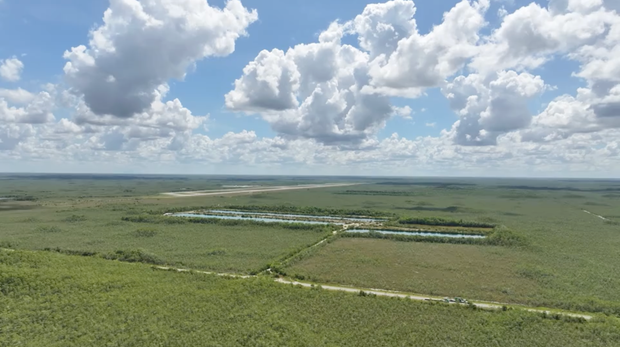In a bold and somewhat controversial move, Homeland Security Secretary Kristi Noem announced on a recent Monday that the federal government would be providing financial backing for Florida’s ambitious plan to establish immigration detention centers, including a high-security facility in the Everglades whimsically nicknamed “Alligator Alcatraz.” The funding for these centers is set to come predominantly through the Federal Emergency Management Agency’s (FEMA) shelter and services program. This program was initially designed by Congress to assist localities and organizations that are dealing with an influx of migrants and asylum-seekers released from federal custody along the U.S.-Mexico border.
FEMA, an agency traditionally known for its role in disaster relief, finds itself at the center of this new initiative as part of the Department of Homeland Security, which has experienced significant budget cuts under President Trump’s second administration. Secretary Noem emphasized the administration’s dedication to implementing cost-effective and innovative solutions to fulfill what she described as the American people’s mandate for mass deportations of criminal illegal aliens. “Under President Trump’s leadership, we are working at turbo speed,” Noem stated, promising rapid expansion of detention facilities and bed space in collaboration with the state of Florida.
The news comes on the heels of an announcement from Florida officials, including the state’s Attorney General James Uthmeier, regarding their plan to aid the federal government in expanding its detainee capacity. A key feature of this plan is the transformation of a largely derelict airfield in the Everglades into a detention center for immigrants residing in the U.S. illegally who have criminal records. The facility, dubbed “Alligator Alcatraz” by Uthmeier, is so named due to the perilous wildlife, including alligators and pythons, inhabiting the surrounding wetlands—a natural deterrent against escapes.
During an interview with conservative commentator Benny Johnson, Uthmeier described the facility as inescapable, stating, “There’s really nowhere to go. If you’re housed there, if you’re detained there, there’s no way in, no way out.” This week, Uthmeier further noted that the federal government had approved Florida’s proposal to construct “Alligator Alcatraz” and other similar sites that could together accommodate up to 5,000 detainees. The facilities are anticipated to begin receiving detainees as early as next month and are currently designated as temporary holdings.
This development is part of a broader effort supported by several Republican-led states aiming to assist the Trump administration in fulfilling its campaign promise of mass deportations. The Trump administration has notably heightened immigration arrests across the nation, a measure supported by law enforcement in GOP-stronghold states such as Louisiana, Texas, and Florida. In Texas, notably, state National Guard troops have been given authority to act as immigration officers, empowering them to enforce federal immigration laws directly.
In a statement reflecting his support for these measures, Attorney General Uthmeier declared, “Florida officials will fight alongside this administration to keep Florida safe, strong, and free.” He expressed pride in aiding President Trump and Secretary Noem in their mission to decisively address the issue of illegal immigration, asserting that facilities like “Alligator Alcatraz” would be instrumental in this endeavor.
The initiative, however, has not been devoid of criticism. Immigration policy experts and human rights advocates have raised concerns about the ethical implications and potential human rights issues stemming from housing detainees in such harsh and isolating conditions. Critics argue that the use of such detention facilities could contravene norms of humane treatment and potentially violate the rights of detainees.
As the plans for these facilities move forward, these debates are likely to intensify, marking another contentious chapter in America’s ongoing dialogue on immigration policy and human rights. The actions of the federal and Florida state governments reflect a larger trend of increasingly stringent immigration control measures under the current administration, a topic that remains sharply divisive among the American public.
The initiative’s proponents and detractors will closely watch as these plans materialize into operational facilities. The outcomes could have significant implications not only for immigration policy and enforcement practices but also for the broader discussion about America’s values when it comes to the treatment of individuals on its soil who are in conflict with its laws.









